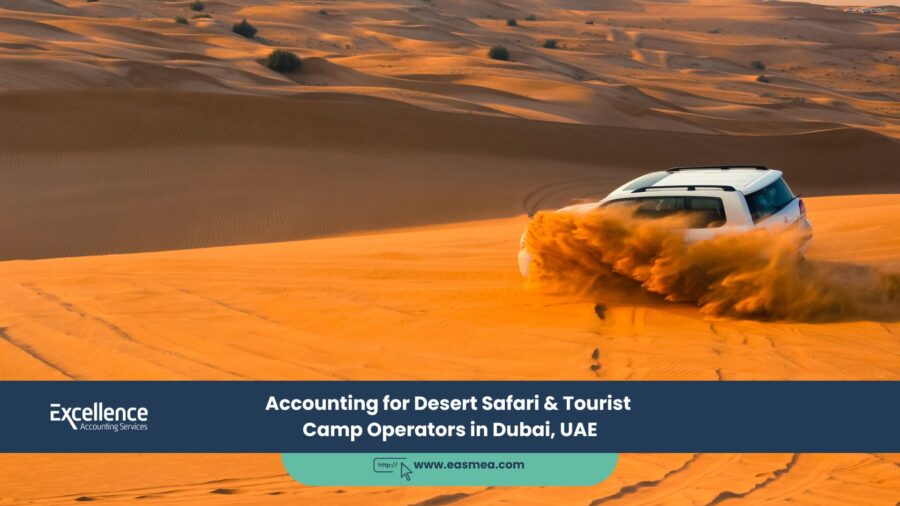The desert safari is an iconic Dubai experience, a cornerstone of the city’s vibrant tourism industry. For the operators who bring this adventure to life, the business is a thrilling blend of hospitality, logistics, and entertainment. While the image is one of exhilarating dune bashing and magical nights under the stars, the reality of running a successful safari company is a demanding operation where financial discipline is the key to navigating the competitive landscape.
Accounting for a desert safari and tourist camp operator in Dubai is a unique challenge. It involves managing a fleet of high-maintenance vehicles, controlling the costs of a remote desert camp, and accurately determining the profitability of various tour packages. Without a robust accounting framework to track these moving parts, even a popular safari company can find its profits sinking into the sand due to un-costed vehicle wear and tear, inefficient operations, and poor pricing.
This definitive guide provides a strategic blueprint for Accounting for Desert Safari & Tourist Camp Operators in Dubai, UAE. We will explore the critical financial practices for this niche sector, from the complexities of vehicle depreciation and maintenance costing to the management of payments for freelance drivers and guides. We will also provide clarity on the application of VAT and the new UAE Corporate Tax to tourism services, ensuring your business is both compliant and profitable.
Whether you run a large fleet of 4x4s or a boutique heritage camp experience, this guide will equip you with the financial knowledge to manage your operations with precision. We will cover industry best practices, essential financial controls, and the reporting that builds trust with tourism partners, employees, and regulatory bodies like the Dubai Department of Economy and Tourism (DET).
Key Takeaways
- Vehicle Costs are Your Biggest Expense: The core of the business is managing the total cost of your vehicle fleet, including purchase, depreciation, insurance, fuel, and extensive maintenance.
- Package Profitability is Essential: You must calculate the precise cost of each safari package (per person), including vehicle costs, driver payments, camp costs (food, entertainment), and commissions, to ensure your pricing is profitable.
- Manage Freelancer and Staff Payments: A clear system is needed to manage payments to both salaried and freelance drivers/guides, often involving a mix of fixed fees and commissions.
- VAT Tour Operator Margin Scheme: You may be eligible to use the special VAT Margin Scheme, which allows you to calculate VAT on your profit margin rather than the full selling price, but it has strict conditions.
- Capital-Intensive Business: The high cost of vehicles and camp setup requires careful capital budgeting and cash flow management to ensure financial stability.
The Financial Anatomy of a Desert Safari Operator
A desert safari business is a unique hybrid of a transport company, a tour operator, and a hospitality provider. The business model is built on creating a memorable experience, with a financial structure dominated by high capital investment in vehicles and significant variable costs related to each tour. Success depends on maximizing vehicle utilization, delivering a high-quality experience, and maintaining tight control over all operational costs.
Operating in Dubai means all tourism activities, including desert safaris, are licensed and regulated by the Dubai Department of Economy and Tourism (DET). As detailed on their official website, operators must adhere to strict safety and service standards, which directly impact your operational procedures and costs.
Core Principles of Accounting for Desert Safari & Tourist Camp Operators in Dubai, UAE
The fundamental principle of accounting for desert safari & tourist camp operators in Dubai, UAE, is the meticulous tracking and allocation of costs to each tour or package. In a business where the main assets (vehicles) are constantly undergoing intense wear and tear, understanding the true cost of every trip is the only way to ensure long-term profitability and sustainability.
The Heart of the Matter: Vehicle Maintenance and Depreciation
Your fleet of 4×4 vehicles is your primary asset and your biggest cost center. The harsh desert environment leads to accelerated wear and tear, making maintenance a huge and ongoing expense. Your accounting system must be designed to track the total cost of ownership for each individual vehicle. This includes:
- Capital Cost and Depreciation: The purchase price of the vehicle is capitalized as a fixed asset and then depreciated over its estimated useful life (e.g., 3-5 years). This annual depreciation is a major non-cash expense.
- Maintenance and Repairs: All costs for regular servicing, tires, and specific repairs must be tracked per vehicle.
- Fuel: The largest variable cost. Using fuel cards for each vehicle is the best way to track consumption.
- Insurance and Registration: The annual fixed costs for each vehicle.
By tracking these costs, you can calculate a “cost per kilometer” for your fleet, which is a vital piece of data for costing your tour packages. It also helps you make informed decisions about when a vehicle has become too expensive to maintain and needs to be replaced.
A Closer Look at Accounting for Desert Safari & Tourist Camp Operators in Dubai, UAE
Profitability in the competitive tourism sector is a direct result of understanding your numbers. This requires a detailed approach to costing your packages and managing your diverse workforce. A professional bookkeeping service can be essential for setting up the necessary financial tracking.
Analyzing Package Deal Profitability
To know if your standard “Evening Desert Safari” package is profitable, you must calculate its per-person cost. This involves a detailed breakdown of all the components that go into one person’s experience:
| Cost Component | Examples | Costing Method |
|---|---|---|
| Vehicle Cost | Fuel, maintenance allocation, depreciation for the trip. | Calculated based on the total distance of the safari route. |
| Driver/Guide Cost | A portion of the driver’s salary or their fixed freelance fee for the trip. | Allocated per trip. |
| Camp Costs | Per-person cost of the BBQ dinner, soft drinks, and water. | Calculated per guest. |
| Activity Costs | Fees for entertainers (belly dancer, fire show), camel ride operator. | The total cost of entertainment divided by the average number of guests. |
| Commissions | Payments to hotel concierges or online travel agents (OTAs) for bookings. | A direct percentage of the selling price. |
In the safari business, the price of the ticket is just the beginning. The real story is told by the cost of the journey.
By summing up all these per-person costs, you arrive at your break-even point for the package. Your selling price must be comfortably above this to ensure a healthy profit margin. This analysis also allows you to see where you can potentially reduce costs without compromising the quality of the experience.
Managing Freelance Drivers and Guides
Many safari companies operate with a mix of full-time employee drivers and freelance drivers who own their own vehicles. This requires two different payment systems. Your employee drivers are on your payroll, and you are responsible for their salaries, visas, and benefits. Freelance drivers are external suppliers. You must have a clear contract with them specifying their fee per trip. They should provide you with a proper invoice for their services. These payments are a direct cost of your tours and should be allocated to the specific trips they conduct.
Navigating Tax and Compliance in Dubai
A professional tour operator in Dubai must be fully compliant with the UAE’s tax regulations. For the most authoritative guidance, you should always refer to the official website of the Federal Tax Authority (FTA).
VAT on Tourism Services: The Tour Operator Margin Scheme
The supply of a desert safari tour is a taxable supply subject to 5% VAT. However, tour operators have the option to use a special scheme called the “Tour Operator Margin Scheme.” Under this scheme, you do not charge VAT on the full selling price of your package. Instead, you calculate your profit margin on the package and charge 5% VAT only on that margin. This can be advantageous, but it comes with very complex record-keeping requirements. You must be able to precisely calculate the cost of all the components of your tour to determine the margin. Many operators find it simpler to apply the standard 5% VAT to the full price. This is a critical decision that requires professional tax advice from a firm that offers expert VAT services.
Corporate Tax for Tour Operators
Your safari company will be subject to the 9% UAE Corporate Tax on its annual taxable profits exceeding AED 375,000. Your taxable profit is your total revenue minus your deductible operating expenses. The accuracy of your vehicle depreciation and maintenance costing will have a direct impact on your tax liability. Maintaining complete records for every transaction is mandatory. Professional corporate tax services are vital for ensuring compliance.
What Excellence Accounting Services Can Offer
At Excellence Accounting Services (EAS), we have extensive experience with the tourism and transport sectors. We understand the unique financial challenges of the desert safari business, from managing fleet costs to the complexities of package costing. We offer specialized accounting services to provide the financial control and strategic insight your business needs.
Our specialized offerings for safari and tour operators include:
- Fleet and Asset Accounting: We help you set up and manage a system to track the costs and depreciation of every vehicle in your fleet.
- Package and Trip Costing: We can help you develop a robust model to calculate the true cost and profitability of your different tour packages.
- Payroll and Freelancer Payment Management: We manage your payroll for employees and help you set up a compliant process for paying your freelance partners.
- VAT and Corporate Tax for Tourism: Our tax experts specialize in the rules for the tourism sector, including the Tour Operator Margin Scheme, and will manage all your FTA filings.
- Virtual CFO Services: Get high-level strategic guidance on pricing, asset replacement strategy, and cash flow management. For more details, see our Virtual CFO services.
By partnering with EAS, you gain a financial team that understands the terrain of your industry. We handle the financial complexity so you can focus on creating unforgettable experiences.
Frequently Asked Questions (FAQs)
This depends on the nature of the repair. A routine service or minor repair is a “Maintenance Expense” and is recorded on your income statement in the period it occurs. A major engine overhaul that significantly extends the useful life of the vehicle is a “capital expenditure.” Its cost should be capitalized—added to the book value of the vehicle on your balance sheet—and then depreciated over the vehicle’s remaining useful life.
The commission you pay to a hotel concierge, a travel agent, or an Online Travel Agency (OTA) is a direct cost of acquiring that sale. It should be recorded as a “Commissions Expense” or as part of your “Sales & Marketing” costs. When analyzing the profitability of a tour package, this commission must be included as one of the direct costs of that specific booking.
The most effective method is to provide each vehicle with a dedicated corporate fuel card (e.g., from ENOC or ADNOC). This prevents drivers from using cash and submitting messy receipts. The fuel card company will provide you with a single, detailed monthly statement that shows the exact fuel consumption for each specific vehicle. This makes accounting much simpler and provides excellent data for tracking your fleet’s fuel efficiency and allocating costs.
This is a key point. These costs are not considered “staff entertainment” or “customer entertainment” in the usual sense. They are a fundamental and direct component of the tour package you are selling. As such, the cost of the food and beverages is considered a direct “Cost of Goods Sold” for your tour package and is fully deductible when calculating your taxable profit.
This is a very high-risk area. Under UAE law, it is illegal for an individual to work, even on a freelance basis, while on a visit visa. All individuals conducting work must have a valid UAE residence visa and work permit. Engaging drivers who are not legally entitled to work exposes your company to severe legal penalties from MOHRE and other authorities. You must ensure all your drivers, whether employees or freelancers, have the proper legal status to work in the UAE.
When you pay a deposit to an entertainment group for a future performance, you have not yet received the service. This payment should be recorded on your balance sheet as a current asset, under an account like “Prepayments” or “Supplier Deposits.” When the performance takes place, you would then move the cost from the balance sheet and record it as an expense on your income statement, allocated to the cost of your camp operations for that period.
It’s a special, optional VAT scheme. Instead of charging 5% VAT on your full selling price, you can choose to calculate your profit margin on the tour package (Selling Price minus the direct cost of the components) and then charge 5% VAT only on that margin. While this can result in a lower price for the customer, it requires extremely detailed and complex record-keeping to prove your margin calculation to the FTA. Most operators find it simpler to apply the standard VAT rules.
Both models have pros and cons. Using freelancers with their own cars (a common model) reduces your upfront capital investment and maintenance liability. However, you have less control over vehicle quality and branding. Having your own fleet and employee drivers gives you complete control over the customer experience and safety standards but involves a much higher fixed cost base and financial risk. Many companies start with a freelance model and move to their own fleet as they grow.
By meticulously tracking the maintenance and repair costs for each vehicle, your accounting data can tell you when a vehicle is becoming uneconomical. When the annual repair costs for an old vehicle start to approach the annual depreciation and financing cost of a new vehicle, it’s a strong financial signal that it’s time to replace it. This data allows you to make a financial decision, not an emotional one.
An independent audit provides credibility. If you want to secure large contracts with international travel agencies, Destination Management Companies (DMCs), or cruise lines, they will often require you to provide audited financial statements as part of their due diligence. It proves you are a professional and financially stable partner. Furthermore, if you ever need a loan from a bank to expand your fleet or build a new camp, they will demand audited financials.
Conclusion: Charting a Path to Sustainable Profit
The desert safari industry in Dubai offers a unique and unforgettable experience to millions of visitors each year. The success of the operators who create this magic is a testament to their hard work, logistical skill, and commitment to hospitality. However, the long-term profitability and sustainability of this business are charted on the map of disciplined financial management.
By mastering the art of package costing, maintaining rigorous control over your high-value vehicle assets, and navigating the UAE’s tax and regulatory landscape with expertise, you build a business that is as resilient as the desert itself. This financial clarity empowers you to price your tours with confidence, manage your operations with efficiency, and build a lasting reputation for quality and reliability in a world-class tourism destination.
From Dune Bashing to a Booming Bottom Line.
Let Excellence Accounting Services provide the specialized financial management and industry insight your tour operation needs to succeed in Dubai.




